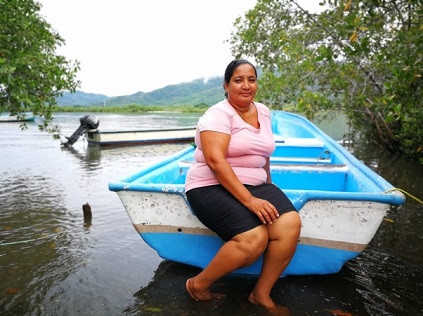Costa Rican fisherwoman shares experiences of the artisanal fishing sector in Brazil
• The Voluntary Guidelines for achieving fisheries sustainability seek to make visible, recognize and promote the valuable role of small-scale fisheries and help eradicate hunger and poverty
Sonia Medina, a fisherwoman from Isla Venado and president of the local Association of fishers of Florida, Isla Venado de Puntarenas shares in Olinda, Brazil the challenges and experiences of the Costa Rican artisanal fishing sector.
According to Medina, one of the most critical situations facing the fishing sector is the warming of the waters, illegal fishing and little access to markets.
Sonia is 44 years old and is part of the fifth generation of her family that has traditionally engaged in fishing. She is also head of the household and mother of two women and one man.
The fisherwoman participates in a meeting that takes place this week, with organizations of the Traditional Fishing Communities of Brazil and other countries of Latin America and the Caribbean.
 Sonia Medina, fisherwomen from Isla Venado ©FAO |
"I was invited to represent the country with another colleague to share our experience in the fisheries sector and also to tell how the country has implemented the Voluntary Guidelines to achieve the sustainability of small-scale fisheries (SSF)", the Costa Rican enthusiastically commented.
The Guidelines were developed as a complement to the Code of Conduct for Responsible Fisheries presented in the framework of the Food and Agriculture Organization of the United Nations (FAO) in 1995. They are also a guiding instrument to identify and address the needs of the fisheries sector and face climate variability.
The Guidelines prioritize small-scale fisheries versus other types of fisheries, which encompass all activities along the value chain, carried out by women and men, which plays an important role in food security and nutrition, the eradication of poverty, equitable development and the sustainable use of resources.
According to Medina, through a government decree, the Guidelines were included in the National Development Plan, which has allowed the participation of a fisherman in the board of directors of the Costa Rican Institute of Fisheries and Aquaculture (INCOPESCA), in order to make the work plan that is driving the artisanal fishing sector visible.
INCOPESCA and the Marine Areas Responsible Fisheries Network (AMPR) with the support of FAO, the REBYC-II LAC project and CoopeSolidar RL, have promoted the process of implementing the Voluntary Guidelines to achieve the sustainability of artisanal fishing at the national.
"We have learned about shared governance and working hand in hand with INCOPESCA; we have also made progress in recognizing the work of women in fisheries. The stereotypes are being broken, many people were surprised that I was appointed as president of the Association, but here I am occupying the post, "said Medina.
The local Association of fisherwomen and fishermen of Florida, Isla Venado and Puntarenas was founded in 2010 and is made up of 65 people. The Association is part of the AMPR Network that seeks to regulate fishing activity to ensure the long-term use of resources.
The fisherwoman, emphasized that in Isla Venado there are approximately 30 women who are engaged in artisanal fishing.
The Guidelines emphasize the importance of ensuring the equal participation of women in decision-making processes, organizations, the use of appropriate technologies, favorable legislation and policies.
They also have a close link with the 2030 Agenda for Sustainable Development, specifically with Goal 5, achieve gender equality and the empowerment of all women and girls, and Goal 14, conserve and sustainably use the oceans, seas and marine resources for sustainable development.
"The situation of women in fisheries is not easy, because for many years it has been considered a work of men. However, we are taking a leading role within organizations and in our communities. The biggest struggle is that our work after fishing, in the process of cleaning and head off shrimp, is also recognized" said Medina.
The effects of climate change are increasingly visible in the sea
Due to the warming of the sea, many marine species tend to migrate to less warm waters.
Climate change is having a great impact on food and nutrition security. Many of the people suffering from chronic undernourishment are family farmers and fishers, who in turn, are the most affected by high temperatures and climate-related disasters.
Octavio Ramírez, FAO Resident Coordinator in Costa Rica, pointed out that the Organization works to identify and reduce the vulnerability of fishing systems to improve their resilience and capacity to adapt to crises, climate change, ocean acidification and natural disasters.
